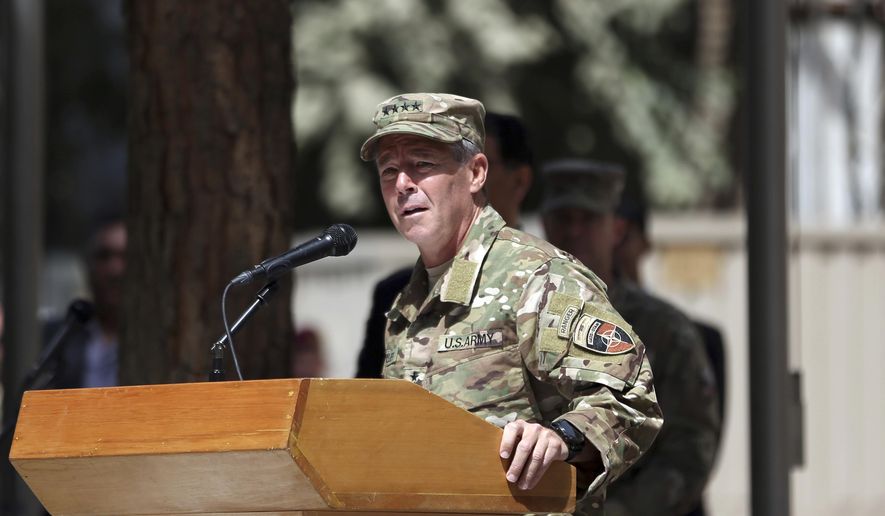The top U.S. general on the ground in Afghanistan told top Pentagon officials that he opposed the total withdrawal of troops before President Biden made the final decision.
In a closed briefing Tuesday to the Senate Armed Services Committee, Gen. Austin Scott Miller confirmed that he registered his dissent with Mr. Biden’s decision with the top brass — Secretary of Defense Lloyd Austin; Gen. Mark Milley, chairman of the Joint Chiefs of Staff; and Gen. Kenneth F. McKenzie Jr., the head of U.S. Central Command.
Mr. Biden was asked in an interview last month whether his military advisers suggested that he keep a residual force in Afghanistan to avoid a total collapse. He told interviewer George Stephanopoulos “No. No one said that to me.”
Sen. James M. Inhofe of Oklahoma, the ranking Republican on the Senate Armed Services Committee, said Tuesday after the closed briefing that “we heard enough to know that there are inconsistencies between what the administration has said and the truth.”
“Clearly President Biden didn’t listen to all military advice,” Mr. Inhofe said.
Gen. Miller, who commanded U.S. and NATO forces in Afghanistan, did not tell President Biden directly that he disagreed with the withdrawal, according to Mr. Inhofe, “because the president wasn’t there.”
Mr. Inhofe did not say specifically when Gen. Miller registered his dissent with his chain of command, or what his specific concerns were, citing the fact that the discussion came in a closed briefing.
According to the Washington Post, Gen. Miller warned against a total pullout and said the rapid collapse of the Afghan government would be the likeliest result. The warning came “months before Biden unveiled his withdrawal decision,” the Post reported. Gen. Miller and Mr. Austin also warned Mr. Biden against withdrawal, the Post reported.
Gen. Miller was confirmed by the Senate in June 2018 to serve as top commander in Afghanistan, a post he held until the end of the war.
Mr. Inhofe said the details he received from Gen. Miller in the closed briefing Tuesday raised concerns.
“I’m even more eager now to hear from Secretary Austin, Gen. Milley, and Gen. McKenzie in two weeks,” he said referring to the open and closed hearings with the Pentagon officials set for Sept. 28.
“This is just a start of an open, exhaustive, transparent process,” he said. “We have a lot more questions and I hope they have some more answers.”
The closed briefing came as Secretary of State Antony Blinken testified before Congress for the second consecutive day Tuesday.
Lawmakers’ questions to Mr. Blinken largely reflected party affiliations.
Infuriated Republicans grilled Mr. Blinken on key decisions leading up the withdrawal, while Democrats often defended President Biden and the administration’s decision to end the war, deflecting blame to former President Donald Trump for the deal he signed with the Taliban in February 2020.
While Tuesday’s closed briefing was to the full Armed Services panel, only the committee Republicans were present at the press conference after the briefing.
After the Sept. 28 hearing with Pentagon officials, the panel will also hold a Sept. 30 hearing titled “Review of U.S. Military Operations in Afghanistan” featuring testimony from yet-to-be-determined external experts.
• Joseph Clark can be reached at jclark@washingtontimes.com.




Please read our comment policy before commenting.